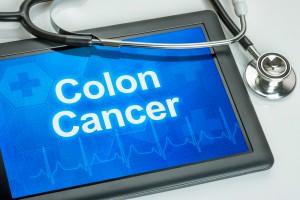Who gets Colon Cancer?

Colon cancer is the third most common cancer that people get. Colon cancer causes more deaths than any cancer except lung cancer. Colon cancer arises from the cells that make up the tissues of the colon. The colon is the part of the gut where waste products from digested food are stored, and then excreted as stool. People with colon polyps are at increased risk for colon cancer. When found, these polyps are removed because they can turn into colon cancer. Some colon cancer runs in families, but most people with colon cancer don’t have it in their family. High-fat diets increase the risk for colon cancer. Colon cancer is rare in countries like Japan, where people eat low-fat diets.
Can Colon Cancer be Cured?
Yes, if it is detected before it has spread outside the colon. This is why early detection is
What is Early Detection of Colon Cancer?
There are several ways that colon cancer is detected early. First, someone who sees blood in their stool should tell their doctor. Their doctor will determine if they need to be tested for colon cancer. People should also report any change in bowel habit, such as diarrhea alternating with constipation, or stool that is more narrow than it was in the past. For people who don’t have symptoms, regular screening usually begins at age 50. People should have their stool tested for “occult blood”, which is a small amount of blood that can’t be seen but is detected with a chemical test. X-rays (called barium enemas) can be used to screen for colon cancer. Colonoscopy is another screening test. Colonoscopy is done by running a fiberoptic camera through the colon. If a tumor is seen, a biopsy is taken to determine if it is cancerous.
How is Colon Cancer Treated?
Colon cancer is treated with surgery, radiation, and medicine. Surgery is the mainstay of treatment, and surgery alone often cures colon cancer. The surgeon takes out the tumor together with half of the colon. Sometimes, a smaller portion of colon is removed. The surgeon occasionally has to make a “colostomy”, to allow stool to pass through the wall of the abdomen into a bag. If a colostomy is made, it may only be temporary. If the tumor is in the lowest part of colon (the rectum), radiation may be recommended after surgery, to “mop up” remaining cells and prevent relapse.
After surgery, the pathologist examines the tumor under the microscope. If there was blockage, rupture, or lymph nodes, there is a good chance the cancer will relapse later. Colon cancer can come back in the colon, liver, or lungs. Colon cancer can come back after surgery because a few cells may have escaped before the surgery. Medicine may be recommended after surgery to kill the escaped cells and prevent a relapse. These medicines are called chemotherapy.
What if Colon Cancer Relapses?
If colon cancer relapses in the colon, it can sometimes be cured with more surgery. If it relapses somewhere else? a single tumor in the liver or lung? it may be cured with more surgery and medicine. If it relapses in more than one place, it is not considered curable. Although it can’t be cured, we have drugs to treat it. These drugs are called chemotherapy. Some examples of chemotherapy drugs include 5-fluorouracil, oxaliplatin, and irinotecan. These drugs have side effects, but the side effects are minor. People on treatment can maintain a good quality of life.
How do People Cope with Colon Cancer?
It is a shock to get a diagnosis of cancer. People have emotions ranging from shock to denial to anger, but people eventually reach acceptance. Most people with colon cancer do well. When people are able to approach their lives with a positive outlook, they can get on with the things that are important to them.

